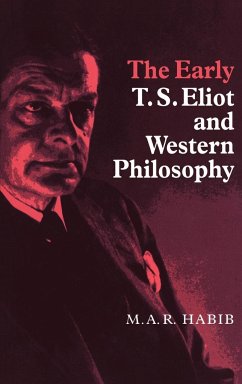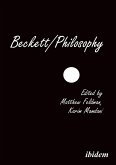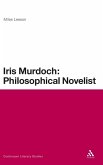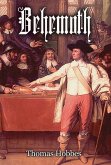- Gebundenes Buch
- Merkliste
- Auf die Merkliste
- Bewerten Bewerten
- Teilen
- Produkt teilen
- Produkterinnerung
- Produkterinnerung
Study of Eliot's philosophical writings, assessing their impact on his early poetry and literary criticism.
Andere Kunden interessierten sich auch für
![Beckett/Philosophy. A Collection Beckett/Philosophy. A Collection]() Matthew FeldmanBeckett/Philosophy. A Collection39,90 €
Matthew FeldmanBeckett/Philosophy. A Collection39,90 €![Iris Murdoch Iris Murdoch]() Miles LeesonIris Murdoch156,99 €
Miles LeesonIris Murdoch156,99 €![Review of the Work of Mr. John Stuart Mill Entitled 'Examination of Sir William Hamilton's Philosoph Review of the Work of Mr. John Stuart Mill Entitled 'Examination of Sir William Hamilton's Philosoph]() George GroteReview of the Work of Mr. John Stuart Mill Entitled 'Examination of Sir William Hamilton's Philosoph29,99 €
George GroteReview of the Work of Mr. John Stuart Mill Entitled 'Examination of Sir William Hamilton's Philosoph29,99 €![The Raymond Tallis Reader The Raymond Tallis Reader]() R. TallisThe Raymond Tallis Reader83,99 €
R. TallisThe Raymond Tallis Reader83,99 €![Sir Thomas Meautys, Secretary to Lord Bacon, and His Friends Sir Thomas Meautys, Secretary to Lord Bacon, and His Friends]() Alice Chambers BuntenSir Thomas Meautys, Secretary to Lord Bacon, and His Friends28,99 €
Alice Chambers BuntenSir Thomas Meautys, Secretary to Lord Bacon, and His Friends28,99 €![The Life of William Bedell, D.D. Bishop of Kilmore in Ireland The Life of William Bedell, D.D. Bishop of Kilmore in Ireland]() Gilbert BurnetThe Life of William Bedell, D.D. Bishop of Kilmore in Ireland37,99 €
Gilbert BurnetThe Life of William Bedell, D.D. Bishop of Kilmore in Ireland37,99 €![Behemoth Behemoth]() Thomas HobbesBehemoth43,99 €
Thomas HobbesBehemoth43,99 €-
-
-
Study of Eliot's philosophical writings, assessing their impact on his early poetry and literary criticism.
Produktdetails
- Produktdetails
- Verlag: Cambridge University Press
- Seitenzahl: 304
- Erscheinungstermin: 28. Mai 2004
- Englisch
- Abmessung: 235mm x 157mm x 22mm
- Gewicht: 647g
- ISBN-13: 9780521624336
- ISBN-10: 0521624339
- Artikelnr.: 21973205
- Herstellerkennzeichnung
- Libri GmbH
- Europaallee 1
- 36244 Bad Hersfeld
- gpsr@libri.de
- Verlag: Cambridge University Press
- Seitenzahl: 304
- Erscheinungstermin: 28. Mai 2004
- Englisch
- Abmessung: 235mm x 157mm x 22mm
- Gewicht: 647g
- ISBN-13: 9780521624336
- ISBN-10: 0521624339
- Artikelnr.: 21973205
- Herstellerkennzeichnung
- Libri GmbH
- Europaallee 1
- 36244 Bad Hersfeld
- gpsr@libri.de
Preface; 1. (a) Henry Adams and the search for unity (b) Irving Babbitt:
the one and the many (c) George Santayana: the marriage of philosophy and
poetry (d) Laforgue, Schopenhauer and the poetry of Eliot's youth; 2.
Bergson Resartus and T. S. Eliot's manuscript (a) Analysis of Eliot's
manuscript on Bergson (b) Significance of Eliot's manuscript; 3. Philosophy
and Laughter (a) Schopenhauer, Laforgue and Bergson, (b) Eliot's Paris
poems: 'Prufrock' and 'Portrait'; 4. Irony as a Kantian meditation: Eliot's
manuscripts on Kant (a) Analysis of Eliot's three manuscripts on Kant (b)
Significance of Eliot's engagement with Kant; 5. Eliot, Bradley and the
irony of common sense (a) Bradley's Philosophical Context (b) Eliot's
doctoral dissertation (c) The objective correlative (d) Eliot's early verse
and Bradley; 6. The divorce from old barren reason: from philosophy to
aesthetics (a) Tradition and impersonality (b) The emotions of art (c)
Impersonality and the bourgeois ego; 7. The struggle against realism (a)
Realism, Romanticism and Classicism (b) Realism refined (c) Language and
reality; 8. Irony as form: 'The Waste Land' (a) Tiresias in literary
tradition (b) Tiresias in 'The Waste Land'.
the one and the many (c) George Santayana: the marriage of philosophy and
poetry (d) Laforgue, Schopenhauer and the poetry of Eliot's youth; 2.
Bergson Resartus and T. S. Eliot's manuscript (a) Analysis of Eliot's
manuscript on Bergson (b) Significance of Eliot's manuscript; 3. Philosophy
and Laughter (a) Schopenhauer, Laforgue and Bergson, (b) Eliot's Paris
poems: 'Prufrock' and 'Portrait'; 4. Irony as a Kantian meditation: Eliot's
manuscripts on Kant (a) Analysis of Eliot's three manuscripts on Kant (b)
Significance of Eliot's engagement with Kant; 5. Eliot, Bradley and the
irony of common sense (a) Bradley's Philosophical Context (b) Eliot's
doctoral dissertation (c) The objective correlative (d) Eliot's early verse
and Bradley; 6. The divorce from old barren reason: from philosophy to
aesthetics (a) Tradition and impersonality (b) The emotions of art (c)
Impersonality and the bourgeois ego; 7. The struggle against realism (a)
Realism, Romanticism and Classicism (b) Realism refined (c) Language and
reality; 8. Irony as form: 'The Waste Land' (a) Tiresias in literary
tradition (b) Tiresias in 'The Waste Land'.
Preface; 1. (a) Henry Adams and the search for unity (b) Irving Babbitt:
the one and the many (c) George Santayana: the marriage of philosophy and
poetry (d) Laforgue, Schopenhauer and the poetry of Eliot's youth; 2.
Bergson Resartus and T. S. Eliot's manuscript (a) Analysis of Eliot's
manuscript on Bergson (b) Significance of Eliot's manuscript; 3. Philosophy
and Laughter (a) Schopenhauer, Laforgue and Bergson, (b) Eliot's Paris
poems: 'Prufrock' and 'Portrait'; 4. Irony as a Kantian meditation: Eliot's
manuscripts on Kant (a) Analysis of Eliot's three manuscripts on Kant (b)
Significance of Eliot's engagement with Kant; 5. Eliot, Bradley and the
irony of common sense (a) Bradley's Philosophical Context (b) Eliot's
doctoral dissertation (c) The objective correlative (d) Eliot's early verse
and Bradley; 6. The divorce from old barren reason: from philosophy to
aesthetics (a) Tradition and impersonality (b) The emotions of art (c)
Impersonality and the bourgeois ego; 7. The struggle against realism (a)
Realism, Romanticism and Classicism (b) Realism refined (c) Language and
reality; 8. Irony as form: 'The Waste Land' (a) Tiresias in literary
tradition (b) Tiresias in 'The Waste Land'.
the one and the many (c) George Santayana: the marriage of philosophy and
poetry (d) Laforgue, Schopenhauer and the poetry of Eliot's youth; 2.
Bergson Resartus and T. S. Eliot's manuscript (a) Analysis of Eliot's
manuscript on Bergson (b) Significance of Eliot's manuscript; 3. Philosophy
and Laughter (a) Schopenhauer, Laforgue and Bergson, (b) Eliot's Paris
poems: 'Prufrock' and 'Portrait'; 4. Irony as a Kantian meditation: Eliot's
manuscripts on Kant (a) Analysis of Eliot's three manuscripts on Kant (b)
Significance of Eliot's engagement with Kant; 5. Eliot, Bradley and the
irony of common sense (a) Bradley's Philosophical Context (b) Eliot's
doctoral dissertation (c) The objective correlative (d) Eliot's early verse
and Bradley; 6. The divorce from old barren reason: from philosophy to
aesthetics (a) Tradition and impersonality (b) The emotions of art (c)
Impersonality and the bourgeois ego; 7. The struggle against realism (a)
Realism, Romanticism and Classicism (b) Realism refined (c) Language and
reality; 8. Irony as form: 'The Waste Land' (a) Tiresias in literary
tradition (b) Tiresias in 'The Waste Land'.

